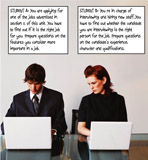GET SMART BEFORE YOU START. Communicative Activities.

In a job interview, you may be asked about your strengths and weaknesses. When you are asked a question about your weaknesses, it is best to mention a skill or trait that does not affect your performance at work. Here are some examples of how you can talk about strengths and weaknesses.
Q: How would you describe your strengths?
I pay attention to details and I'm patient.
I'm very thorough and I work well in a team.
I have a good sense of humour and I've been told that I put guests at ease.
My current boss says I'm very efficient and I'm always punctual.
Q: What weaknesses do you have?
I'm a perfectionist so I sometimes stay back at work to check everything is OK.
I need to improve my range of vocabulary in English, so I'm studying each week at home.
I enjoy learning and improving my knowledge . It takes up some of my spare time.
1.- Reading Activity.

What are employers looking for?
Most employers say that they wish to employ the right person for the right job. A recent report by Britain's independent Institute of Manpower Studies, however, disagrees with this. The report states that most employers wish to avoid employing the wrong person. Rather than looking for the right person, they are looking for applicants to turn down.
The report also suggests that in Britain and in many other parts of the world, the selection methods used to identify the right person for the job certainly do not match up to those used to evaluate a piece of new equipment. Recruiters used three main selection methods: interviewing, checking curriculum vitae or application forms against predecided criteria, and examining references. Most of the recruiters consulted in this survey stated that these selection methods were used more for "weeding out" unsuitable candidates rather than for finding suitable ones.
Interviews were considered to be more reliable than either curriculum checks or references from past employers. Research, however, proves otherwise. Interviewers' decisions are often strongly influenced by their previous assessment of the written application. Also, different recruiters interpret facts differently. One may consider candidates who have frequently changed jobs as people with broad and useful experience. Another will view such candidates as unreliable and unlikely to stay for long in the new job. Some employers place great importance on academic qualifications whereas the link between this and success in management is not necessarily strong. Some recruiters use handwriting as a criterion. The report states that there is little evidence to support the validity of the latter for assessing working ability. References, also, are sometime unreliable as they are rarely critical, whereas checks on credit and security records and applicants' political leanings are often the opposite.
The report is more favourable towards trainability tests and those which test personality and personal and mental skills. The report concludes by suggesting that interviewing could become more reliable if the questions were more structured and focused on the needs of the employing organisation.
Adapted from http://www.linguarama.com/ps/292-1.htm
Match words from the text and its definitions.
| Word | Number | Definition |
|---|---|---|
| Interpret. | 1. Reject. | |
| Turn down. | 2. A written account of a person's education and work experience. | |
| Curriculum Vitae. | 3. Standards or principles upon which judgements are based. | |
| Leanings. | 4. Eliminating people or things or unacceptable quality. | |
| Weeding out. | 5. Place a particular meaning on something. | |
| Criteria. | 6. Slight tendency to favour one thing rather than the other. |
2.- Listening Activity.
Ajai Kumar is trying to get in touch with the job centre consultant because he’s quite concerned about his working conditions and he’s seeking some professional advice.

Summarising and retelling.
Read carefully the following sentences and fill in the gaps with your own words summarising his two main problems and the pieces of advice he’s provided with.
- Problem: Ajai’s boss is asking him to
.
Pieces of advice: Ajai should . If his boss insists on his request, Ajai should .
- Problem: Ajai would like to
.
Piece of advice: He should .
At the end of the listening the conversation fades out. Complete Amanda’s recommendation and post it in the forum of the unit.
Ajai Kumar: I’m interested in the assistant chef post. I used to work as a cook in my country. I really enjoyed cooking and the kitchen atmosphere. I’ve been told I’m good at preparing traditional dishes but the problem is that I know nothing about local dishes and international cuisine...
Amanda Smith: In that case I would recommend the course on …
Now you can listen again and read at the same time.
3.- Speaking Activity.
Write some notes about what you do every day: your daily routine. Then send a message to the forum telling your partners and tutor about it. Try not to read your notes. Speaking is not reading! It is normal to repeat things, to hesitate and to make mistakes.

Find a partner to practice a job interview. You should use one of the jobs advertised in section 2 of this unit (Blue Skies Hostels, Burger Kingdom and large restaurant chain). One of you is applying for the job and the other is in charge of interviewing and hiring new staff at one of the companies that advertised vacancies.
4.- Writing Activity.

Write 10 Dos or Dont's to help people who are writing letters of application and then post it on the forum of the unit. The first ones have been done for you.
- Do check for spelling and grammar mistakes.
- Don't use initials for company names or qualifications.
Decide which of the following are the most important features of a good job for you. Tell your partners and tutor on the unit forum about it, giving reasons.
- A good salary.
- Benefits (commissions, cheap holidays).
- Atmosphere / friendly colleagues.
- Promotion.
- Security / job stability.
- Freedom.
- Responsibility.
- A chance to travel.
- Long holidays.
- Flexible working hours.
- Opportunity to meet people.
- Respectability.
Appendix I.- Transcript.
What a travel agent does.
Travel agents help travellers sort through vast amounts of information to help them make the best possible travel arrangements. They offer advice on destinations and make arrangements for transportation, hotel accommodation, car rentals, cruises and tours for their clients. In addition, resorts and specialty travel groups use travel agents to promote travel packages to their clients.
Travel agents are also expected to give information about the weather conditions, local laws and customs, attractions and exhibitions, customs regulations, required papers (passports, visas, and certificates of vaccination) and currency exchange rates in the destinations.
A love of travel and knowledge and enthusiasm for advising people about travel destinations and itineraries are important for a travel agent. Superb communication and computer skills are essential. Travel agents must be well-organized and detail-oriented. They must also be professional and courteous when dealing with travel representatives and clients. Other desirable qualities include good writing and interpersonal skills and sales abilities. Personal travel experience and business experience are important too.
The minimum requirement for those interested in becoming a travel agent is a high school diploma or equivalent, although many travel agencies prefer applicants who have a university degree and business or travel experience. Much of the training is provided on the job.
Training specific to becoming a travel agent is available at many vocational schools with full-time travel agent programmes. Travel agent courses also are offered in public adult education programs, online, and in community colleges. A few universities offer bachelor's or master's degrees in travel and tourism. Continuing education is critical because the abundance of travel information readily available through the Internet and other sources has resulted in a more informed consumer who wants to deal with an expert when choosing a travel agent.
Experience, sales ability, and the size and location of the agency determine the earnings of a travel agent. The average annual salary of a travel agent is $32,000. Salaried agents usually enjoy standard employer-paid benefits that self-employed agents must provide for themselves. When travelling for personal reasons, agents usually get reduced rates for transportation and accommodation. In addition, agents sometimes take trips, at lower cost or no cost at all, to learn about various vacation sites.
Agents face increasing competition from travel and airline websites for low-cost fares, but travellers still prefer using travel agents who can provide customized service and planning for complex itineraries to remote or multiple destinations. To attract these travellers, many travel agents specialize in specific interest destinations, travel to certain regions, or in selling to particular demographic groups.
Adapted from http://www.careerplanner.com/Job-Outlook/Travel-Agents.cfm
Appendix.- Licenses of Resources.
| Resource (1) | Resource information (1) | Resource (2) | Resource information (2) |
|---|---|---|---|
 |
By: Stockbyte. License: Uso educativo no comercial para plataformas públicas de Formación Profesional a distancia. From: CD-DVD Num. CD165. |
 |
By: Stockbyte. License: Uso educativo no comercial para plataformas públicas de Formación Profesional a distancia. From: CD-DVD Num. V43. |
 |
By: Stockbyte. License: Uso educativo no comercial para plataformas públicas de Formación Profesional a distancia. From: CD-DVD Num. V43. |
 |
By: net_efekt. License: CC by-nc-sa. From: http://www.flickr.com/photos/wheatfields/697228051/ |
 |
By: Maribel Álvarez. License: Uso educativo no comercial para plataformas públicas de Formación Profesional a distancia. From: Montaje sobre la siguiente imagen:
|
 |
By: Stockbyte. License: Uso educativo no comercial para plataformas públicas de Formación Profesional a distancia. From: CD-DVD Num. CD165. |
